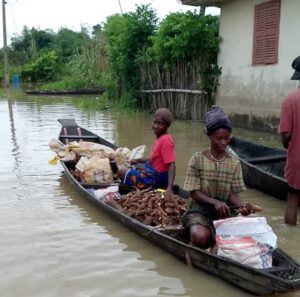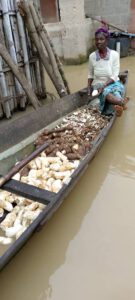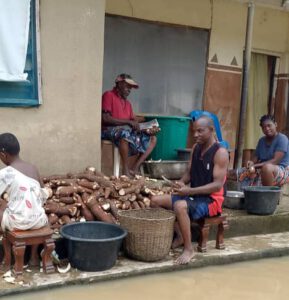… as farmers weep, widows cry out, families watch futures crumble
And while voices rise calling for urgent help, floodwaters continue to rise faster, threatening to drown not only lands and crops, but also the hope of an already struggling people.
By Deborah Hassan
365Daily – Flooding has once again devastated communities in Ogbaru Local Government Area of Anambra State, crippling economic activities and forcing farmers to harvest their crops prematurely.
Heavy rainfall and the swelling of the River Niger have combined to submerge farmlands and render roads impassable, especially in riverine communities such as Ossomala, Obeagwe, Akili Ogidi, Ogwuikpele, and Ogwuaniocha.
During a visit to the affected areas over the weekend, journalists accompanied a delegation from the Constituency Office of the member representing Ogbaru Federal Constituency, Hon. Afam Ogene, to assess the impact.
Speaking during the visit, farmers expressed frustration and helplessness over their losses. Mr. Adimali Nwachukwu, a yam and cassava farmer in Ogwuikpele, said he had taken loans to invest in farming but was now facing ruin.
“The flood has destroyed me. It has ruined my hopes and wasted my labour. I don’t know where to start from,” he said. “With this flood and premature harvesting, I’m not sure I’ll even get up to 25 percent of what I invested in this year’s farming.”
Similarly, a widow, Mrs. Nwakaego Nwafili, who farms cassava and maize, said she could not afford labourers to assist with the harvest.
“This year’s flood is suffocating me. I haven’t been sleeping at night. All my crops are underwater. I’m doing the premature harvesting by myself,” she said. “As a widow, I rely on farming to feed and care for my three children after my husband passed away five years ago. Please, tell the government to help us.”

Another resident, Madam Oluchi Nzekwe, said the stress of the flooding has affected her husband’s health.
“My husband’s blood pressure has skyrocketed since the flood began. We depend solely on farming. We can no longer access our land, and harvesting what is left seems impossible,” she said.”My husband’s blood pressure has gone up. He has worked so hard to educate our seven children, three of whom are in university. But now he can’t access our farm, and he’s sinking into despair,” she said. “We’re overwhelmed. This flood has thrown our whole family into a crisis.”

“The situation is heartbreaking,” one observer said. “These are people who work hard and now have nothing to show for it. They need urgent help.”
Residents are pleading with both the federal and state governments to act swiftly. “We don’t want handouts,” said a farmer in Akili Ogidi. “We want a sustainable response. We want to be able to farm without losing everything every year.”
In June, the National Emergency Management Agency (NEMA), in collaboration with Anambra’s State Emergency Management Agency (SEMA), had visited Ogbaru for a flood simulation and sensitisation exercise. The aim was to prepare communities and test multi-agency coordination.
At the time, NEMA Director-General Mrs. Zubaida Umar described the simulation as “a demonstration of the agency’s proactive approach to disaster management.”
“Today, we simulate a crisis so that we can better respond when the real one strikes,” Umar said. “Preparedness saves lives.”
But now that the real crisis has arrived, many in Ogbaru are questioning whether the drills translated into action. “We were told help would come quickly because of the simulation,” said a community leader in Ossomala. “But the waters are here, and we are still on our own.
Ogbaru’s flood problem is not new. Its location along the River Niger, bordered by Delta and Rivers states, makes it particularly vulnerable to annual flooding. But residents say the government’s failure to implement lasting solutions has turned the yearly crisis into a cycle of neglect.
“This is not just a natural disaster,” said a youth leader in Ogwuaniocha. “It’s man-made too, because it’s about failure to build infrastructure, failure to provide drainage, failure to resettle high-risk communities, and failure to invest in flood defenses.”
For now, Ogbaru remains at the mercy of the elements. And while voices rise calling for urgent help, floodwaters continue to rise faster, threatening to drown not only lands and crops, but also the hope of an already struggling people.
Many residents are calling on the federal and state governments to provide emergency assistance to save their livelihoods.
